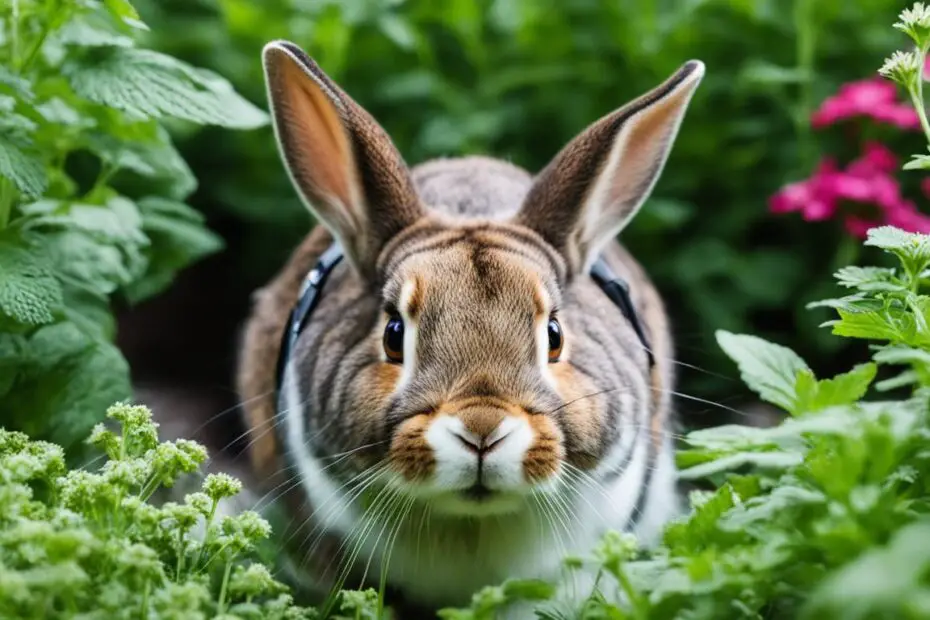Rabbits are popular pets known for their adorably twitching noses and fluffy tails. As responsible rabbit owners, it’s crucial to provide them with a safe and balanced diet. One question that often arises is whether rabbits can have catnip, a herb that has a well-known effect on our feline friends.
The answer is yes, rabbits can indeed have catnip, but it’s essential to take some precautions and understand the dynamics of the rabbit-catnip interaction. In this article, we will explore the effects of catnip on rabbits and provide guidance on introducing catnip into their lives.
Key Takeaways:
- Rabbits can have catnip, but it should be limited to prevent gastrointestinal issues.
- Introduce catnip gradually to observe your rabbit’s reaction and enjoyment.
- Remove the seed head of the catnip plant before offering it to rabbits.
- Dried catnip can pose choking hazards to rabbits, so choose fresh catnip as a safer alternative.
- Respect your rabbit’s preference when it comes to catnip and offer other safe herbs, toys, or treats as alternatives.
What Is Catnip?
Catnip is a perennial herb that belongs to the Mint family. It has more than 250 varieties, but the most common ones are Common catnip (Nepeta cataria) and Catmint (Nepeta mussinii). The active ingredient in catnip that attracts cats and rabbits is nepetalactone. Catnip has a minty smell due to its aromatic oils. It’s important to note that catnip should be pesticide-free for rabbits.
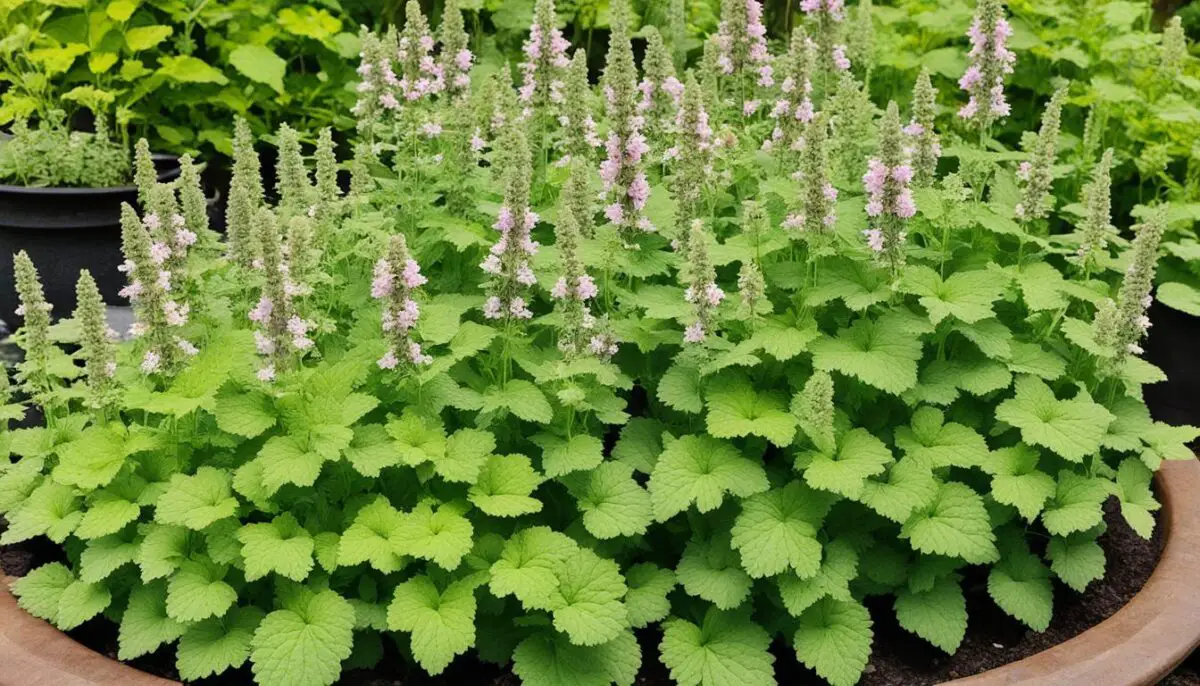
| Variety | Description |
|---|---|
| Common Catnip (Nepeta cataria) | A popular variety known for its strong effect on cats and rabbits. Its leaves and stems are commonly used for pet toys. |
| Catmint (Nepeta mussinii) | Another common variety that has a milder effect on cats and rabbits. It can be a suitable alternative for those who find common catnip too stimulating. |
| Other varieties | There are numerous other catnip varieties available, each with its own unique characteristics and potency. |
Rabbits and Catnip
Catnip is safe for rabbits to consume, although their reaction to it is not the same as cats. While catnip can be used for training or to help rabbits calm down and relax, it’s important to be aware of certain precautions.
The seed head of the catnip plant is not safe for rabbits, so it should always be removed before offering the plant to them.
Additionally, dried catnip can pose a risk to rabbits. Its texture can be a choking hazard and may even cause damage to the soft tissues inside their mouths. It’s crucial to keep a watchful eye and ensure that the catnip provided to rabbits is fresh and free from any potential hazards.
If you’re considering introducing catnip to your rabbits, it’s advisable to consult a veterinarian for personalized guidance and recommendations.
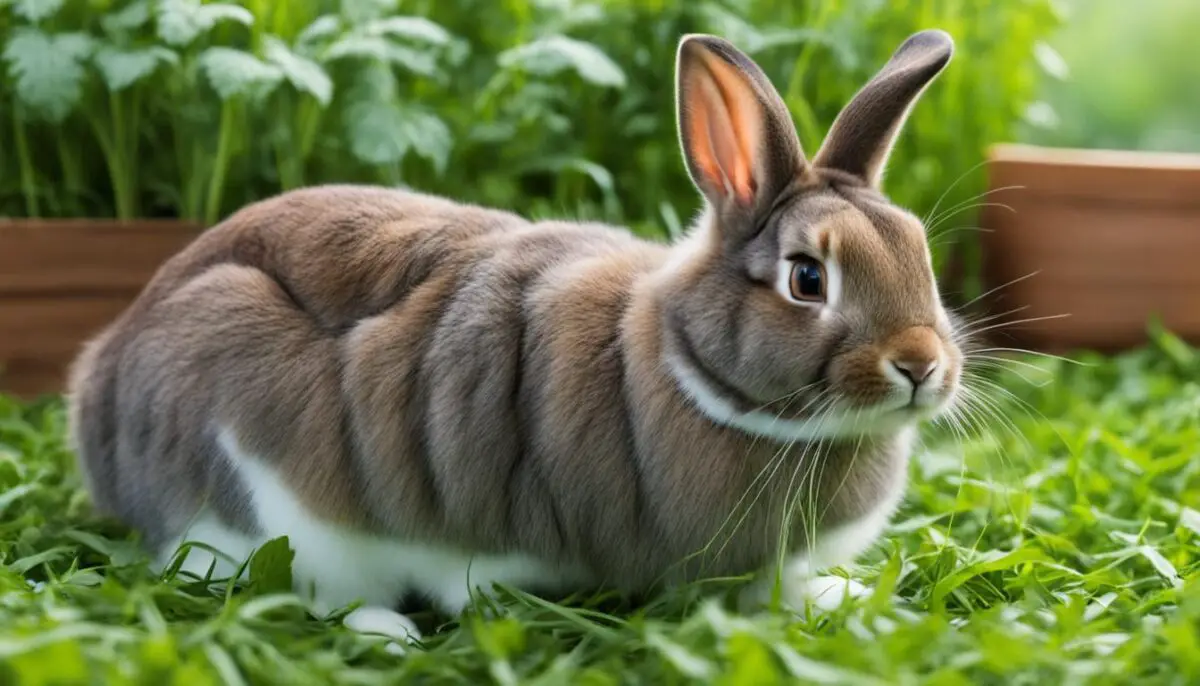
How Much Catnip Can a Rabbit Eat?
When it comes to offering catnip to your rabbit, moderation is key. Young bunnies should not consume catnip until they are at least 12 weeks old. This is because their gastrointestinal tracts are more sensitive, and catnip can cause digestive issues for them. Once your rabbit reaches the appropriate age, you can offer them 5 or 6 catnip leaves at a time.
It’s important to remember that catnip should not replace your rabbit’s regular diet but rather be given as an occasional treat. Offering catnip once or twice per week is sufficient. Starting with small amounts is recommended to see if your rabbit enjoys it and to allow their body to adjust.
Here are some key points to keep in mind:
- Wait until your rabbit is at least 12 weeks old before offering catnip
- Offer 5 or 6 catnip leaves at a time
- Provide catnip once or twice per week, not as a replacement for their regular diet
Introducing catnip gradually and in appropriate quantities will help ensure your rabbit’s well-being and enjoyment. Pay attention to your rabbit’s individual preferences and reactions, as every bunny is unique.
Do Rabbits Like Catnip?
Every rabbit is different, so their preference for catnip may vary. Some rabbits may enjoy catnip and find it pleasing, while others may not be interested in it at all. The strong scent of catnip is designed to deter grazing animals from eating it, so some rabbits may dislike the aroma. It’s important to respect your rabbit’s preferences and not force them to eat catnip. Instead, offer other herbs and veggies as treats to keep their diet balanced.
Some rabbits may exhibit different reactions to catnip. While some may show excitement and playfulness, others may have a calmer or indifferent response. It’s essential to observe your rabbit’s behavior when introducing catnip to determine their individual reaction. Providing a safe and stimulating environment for your rabbit to explore catnip can help identify their preferences.
It’s worth noting that catnip should not be considered a necessary part of a rabbit’s diet. While some rabbits may enjoy it, others may not have any interest in catnip. As a responsible pet owner, it’s crucial to offer alternative treats to cater to their individual preferences. Experimenting with a variety of herbs, such as parsley, cilantro, or basil, can provide alternative flavors for your rabbit to enjoy.
Offering Alternative Treats
When providing alternative treats to your rabbit, it’s important to remember that moderation is key. Too many treats, including herbs, can lead to an imbalanced diet and potential health issues. Treats should only make up a small portion of a rabbit’s overall daily food intake. Here are some safe and healthy treats you can offer your rabbit alongside or instead of catnip:
- Fresh leafy greens: Offer a variety of fresh, rinsed greens such as romaine lettuce, dandelion greens, or spinach. Aim for about 1 cup of leafy greens per 2 pounds of your rabbit’s body weight.
- Small amounts of fruit: Offer small portions of fruits like apple slices, banana slices, or strawberries as an occasional treat. Limit fruit intake due to their high sugar content.
- Edible flowers: Some rabbits enjoy nibbling on edible flowers such as pansies, roses, or marigolds. Ensure the flowers are pesticide-free and safe for consumption.
Remember to introduce new treats gradually and in small quantities to avoid digestive upset. It’s always a good idea to consult with a veterinarian to ensure you are providing the best treats for your rabbit’s specific dietary needs.
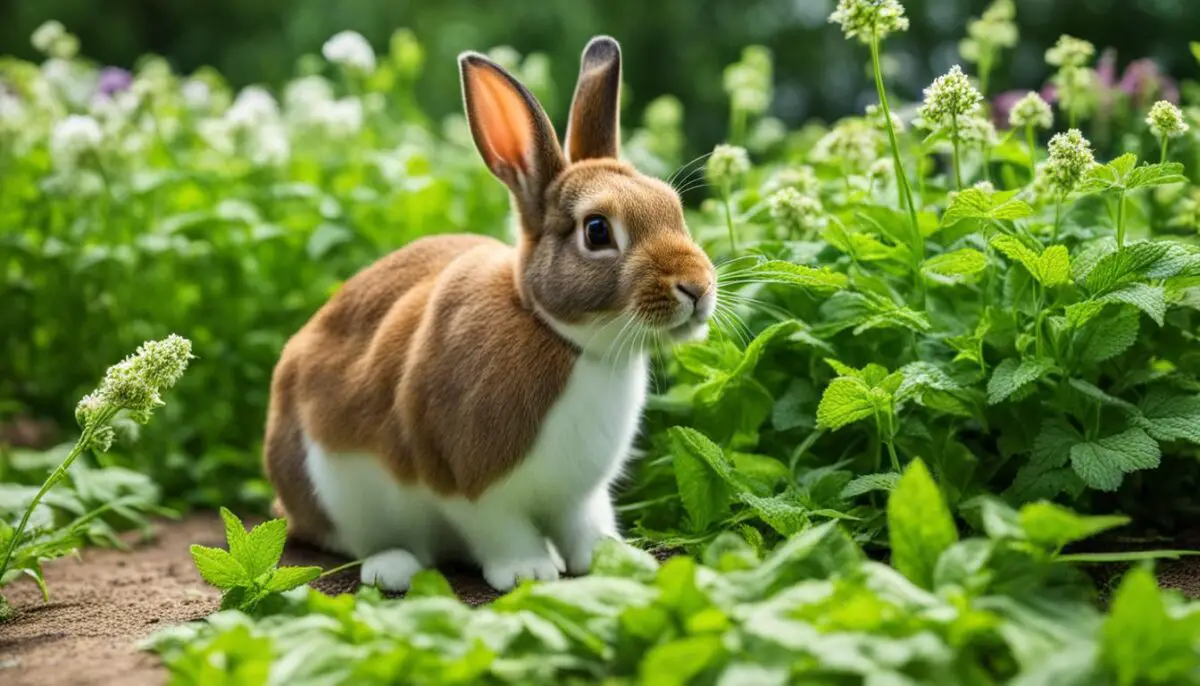
What About Catnip Toys?
Catnip toys can be a source of enrichment for rabbits, providing them with mental stimulation and entertainment. However, it’s essential to choose these toys carefully to ensure the safety and well-being of your furry friend.
When considering catnip toys for rabbits, it’s important to be aware of the potential risks associated with them. While catnip itself is generally safe for rabbits, certain aspects of catnip toys can pose hazards.
- Potential Risks: Dried catnip in toys can be harmful to rabbits’ mouths and may cause choking if ingested. It’s crucial to ensure that the toy materials are safe and won’t easily come apart. Rabbits have a tendency to chew on objects, so it’s important to choose durable and rabbit-safe toys to prevent any potential blockages or other problems.
When selecting catnip toys for rabbits, prioritize their safety above all else. Opt for toys made specifically for rabbits and ensure they are sturdy and free from any small parts that could be ingested. It’s also advisable to choose toys that are made from natural and non-toxic materials to avoid any potential harmful effects.
Remember to supervise your rabbit while they play with catnip toys and regularly inspect the toys for any signs of wear or damage. If you notice any deterioration, it’s best to replace the toy immediately to prevent any potential risks.
By selecting the right catnip toys and prioritizing your rabbit’s safety, you can provide them with a stimulating and enjoyable playtime experience.
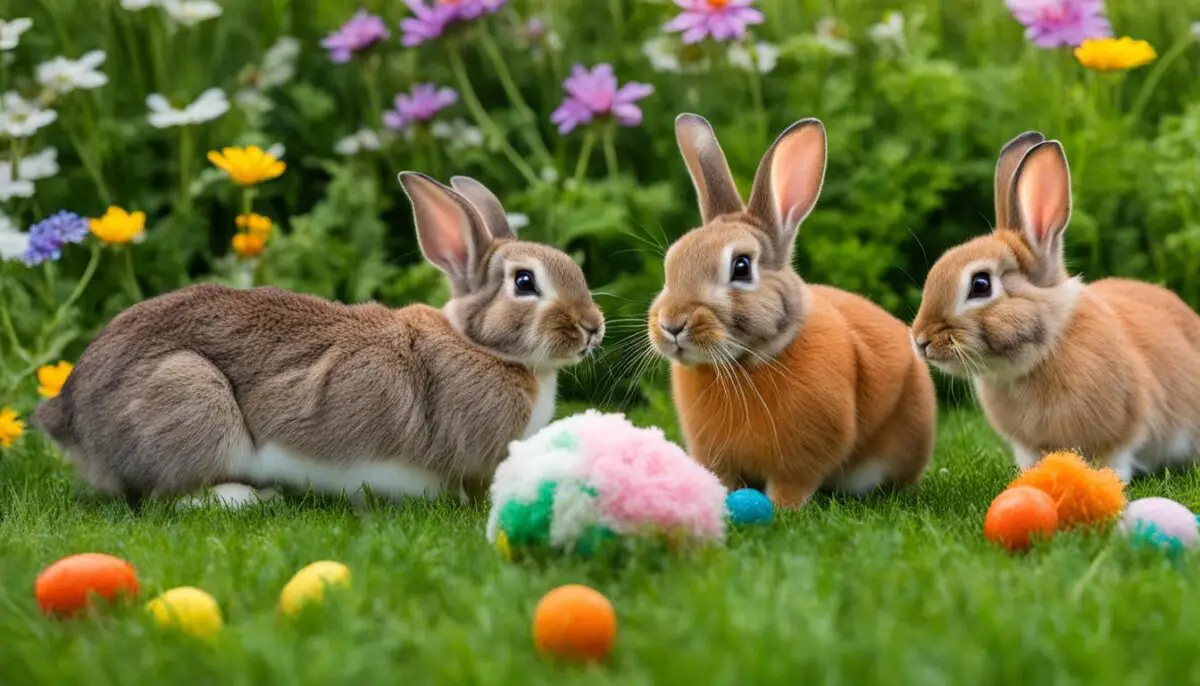
Keep in mind that while catnip toys can be a fun addition to your rabbit’s playtime, they should not replace their regular diet or other forms of enrichment. Always consult with your veterinarian for specific advice regarding your rabbit’s well-being and dietary needs.
Your Bunny’s Normal Diet
Along with understanding catnip, it’s essential to know about a rabbit’s normal diet. Rabbits have specific dietary needs to ensure their overall health and well-being. Let’s take a closer look at the components that make up a rabbit’s diet.
The Importance of Hay
Hay should make up 80-90% of a rabbit’s diet and should be available to them at all times. Hay is essential for maintaining a healthy digestive system and dental health. It provides the necessary fiber that promotes proper digestion and helps prevent gastrointestinal issues.
There are several types of hay that are suitable for rabbits. Some of the best options include:
- Timothy hay
- Orchard grass
- Oat hay
- Brome hay
These varieties of grass hay are low in calories and high in fiber, making them ideal for a rabbit’s normal diet.
Pellets, Fruits, Vegetables, and Herbs
In addition to hay, rabbits can be given small amounts of pellets, fruits, vegetables, and herbs. However, it’s important to remember that these foods should only make up a small portion of their overall diet.
Pellets provide essential nutrients and should be high in fiber with no added sugars or artificial additives. It’s recommended to feed pellets in limited quantities based on your rabbit’s size and age.
Fruits can be offered as occasional treats due to their higher sugar content. Some safe fruits for rabbits include apples, strawberries, and blueberries. However, fruits should be given sparingly to prevent digestive upset.
Vegetables are an excellent source of vitamins and minerals for rabbits. Some suitable options include leafy greens like romaine lettuce, spinach, and kale. Carrots, bell peppers, and broccoli can also be included in their diet.
Herbs can be given to rabbits for added variety and flavor. Safe herbs for rabbits include cilantro, parsley, basil, and dill. Herbs can be offered in small amounts and should be pesticide-free.
The Balanced Diet
It’s important to balance your rabbit’s diet by providing appropriate portions of each food group. Remember to always introduce new foods gradually and monitor your rabbit’s response to ensure they tolerate them well.
Here’s an example of a daily diet for a healthy rabbit:
| Food Group | Portion |
|---|---|
| Hay | Unlimited |
| Pellets | 1/8 cup per 5 pounds of body weight |
| Fruits | 1-2 tablespoons |
| Vegetables | 1-2 cups |
| Herbs | A few sprigs |
Remember to consult with a veterinarian to determine the specific dietary needs of your rabbit based on their age, weight, and overall health. Every rabbit is unique, and their nutritional requirements may vary.
Conclusion
In summary, it is safe for rabbits to have catnip, but it should be given in moderation to avoid any potential gastrointestinal issues. Fresh catnip is the recommended choice for rabbits, and it can be offered as a treat or for training purposes. However, it’s important to remember that not all rabbits may enjoy catnip, and their personal preferences should be respected.
When introducing catnip or any other new herb or treat to your rabbit, always prioritize their safety and well-being. Consult with a veterinarian for specific advice regarding your rabbit’s diet and overall health. Remember, a balanced diet and careful moderation are key to ensuring the happiness and longevity of your furry friend.
By following these guidelines and providing your rabbit with a variety of safe and healthy foods, including catnip in moderation, you can enhance their well-being and strengthen your bond with them. Enjoy exploring the world of herbs and treats together with your beloved rabbit!
FAQ
Can rabbits have catnip?
Yes, rabbits can have catnip, but it’s important to limit the amount to avoid gastrointestinal upset.
What is catnip?
Catnip is a perennial herb that belongs to the Mint family. It has more than 250 varieties, but the most common ones are Common catnip (Nepeta cataria) and Catmint (Nepeta mussinii). The active ingredient in catnip that attracts cats and rabbits is nepetalactone.
Are catnip toys safe for rabbits?
Catnip toys can be a source of enrichment for rabbits, but it’s important to choose them carefully. Dried catnip in toys can be harmful to rabbits’ mouths and may cause choking. It’s crucial to ensure that the toy materials are safe and won’t easily come apart, as ingesting them can lead to blockages and other problems.
How much catnip can a rabbit eat?
Once rabbits are old enough, they can be offered 5 or 6 catnip leaves at a time. It’s important to only provide catnip once or twice per week and not as a replacement for their regular diet.
Do all rabbits like catnip?
Every rabbit is different, so their preference for catnip may vary. Some rabbits may enjoy catnip and find it pleasing, while others may not be interested in it at all. The strong scent of catnip is designed to deter grazing animals from eating it, so some rabbits may dislike the aroma.
What should be a rabbit’s normal diet?
Hay should make up 80-90% of a rabbit’s diet and should be available to them at all times. Grass hay like Timothy, orchard grass, oat, and brome hay are the best choices. In addition to hay, rabbits can be given small amounts of pellets, fruits, vegetables, and herbs. It’s important to balance their diet and provide appropriate portions of each food group.
Is catnip safe for rabbits?
Catnip is safe for rabbits to consume, but they don’t react to it in the same way as cats. It is often used for training or to help rabbits calm down and relax. However, the seed head of the catnip plant is not safe for rabbits, so it should be removed before offering it to them. It’s important to note that dried catnip can be a choking hazard for rabbits and may damage the soft tissues inside their mouths.
Can I introduce catnip to my rabbit?
Yes, you can introduce catnip to your rabbit. Start with small amounts to see if your rabbit enjoys it and to allow their body to adjust. It’s important to respect your rabbit’s preferences and not force them to eat catnip. Instead, offer other herbs and veggies as treats to keep their diet balanced.
Are there alternatives to catnip for rabbits?
If your rabbit doesn’t enjoy catnip, there are other safe herbs you can offer as alternatives. Some options include parsley, cilantro, mint, basil, and dill. Always introduce new herbs gradually and in small quantities to ensure your rabbit tolerates them well.


